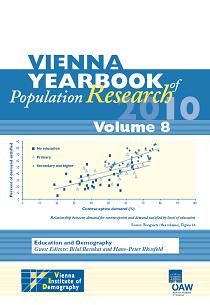|
 |
Contents:
Introduction
Bilal Barakat - Hans-Peter Blossfeld: The search for a demography of education: some thoughts
Demographic Debate
Wolfgang Lutz: Education will be at the heart of 21st century demography
Harvey J. Graff: The Literacy Myth: literacy, education and demography
Alaka Malwade Basu: Mass schooling, empowerment, and demographic and economic outcomes: a note of dissent
Refereed Articles
John Bongaarts: The causes of educational differences in fertility in Sub-Saharan Africa
Christos Bagavos: Education and childlessness: the relationship between educational field, educational level, employment and childlessness among Greek women born in 1955-195
Karel Neels - David De Wachter: Postponement and recuperation of Belgian fertility: how are they related to rising female educational attainment?
Jan Van Bavel - Joanna Ró¿a¿ska-Putek: Second birth rates across europe: interactions between women's level of education and child care enrolment
Johannes Klotz: Convergence or divergence of educational disparities in mortality and morbidity? The evolution of life expectancy and health expectancy by educational attainment in Austria in 1981-2006
Regina Fuchs - Elsie Pamuk - Wolfgang Lutz: Education or wealth: which matters more for reducing child mortality in developing countries?
Samir KC - Harold Lentzner: The effect of education on adult mortality and disability: a global perspective
Priska Flandorfer - Katrin Fliegenschnee: Education and health: theoretical considerations based on a qualitative grounded theory
Martin Spielauer: Persistence and change of the relative difference in educational attainment by ethno-cultural group and gender in Canada
Eduardo Luiz Gonçalves Rios-Neto - Raquel Rangel de Meireles Guimarães: The demography of education in Brazil: inequality of educational opportunities based on Grade Progression Probability (1986-2008)
|




 Home
Home
 Print
Print
 References
References
 Share
Share
